トルストイ『クロイツェル・ソナタ』あらすじと感想~不倫疑惑の妻を殺した夫。賛否両論を巻き起こした問題作
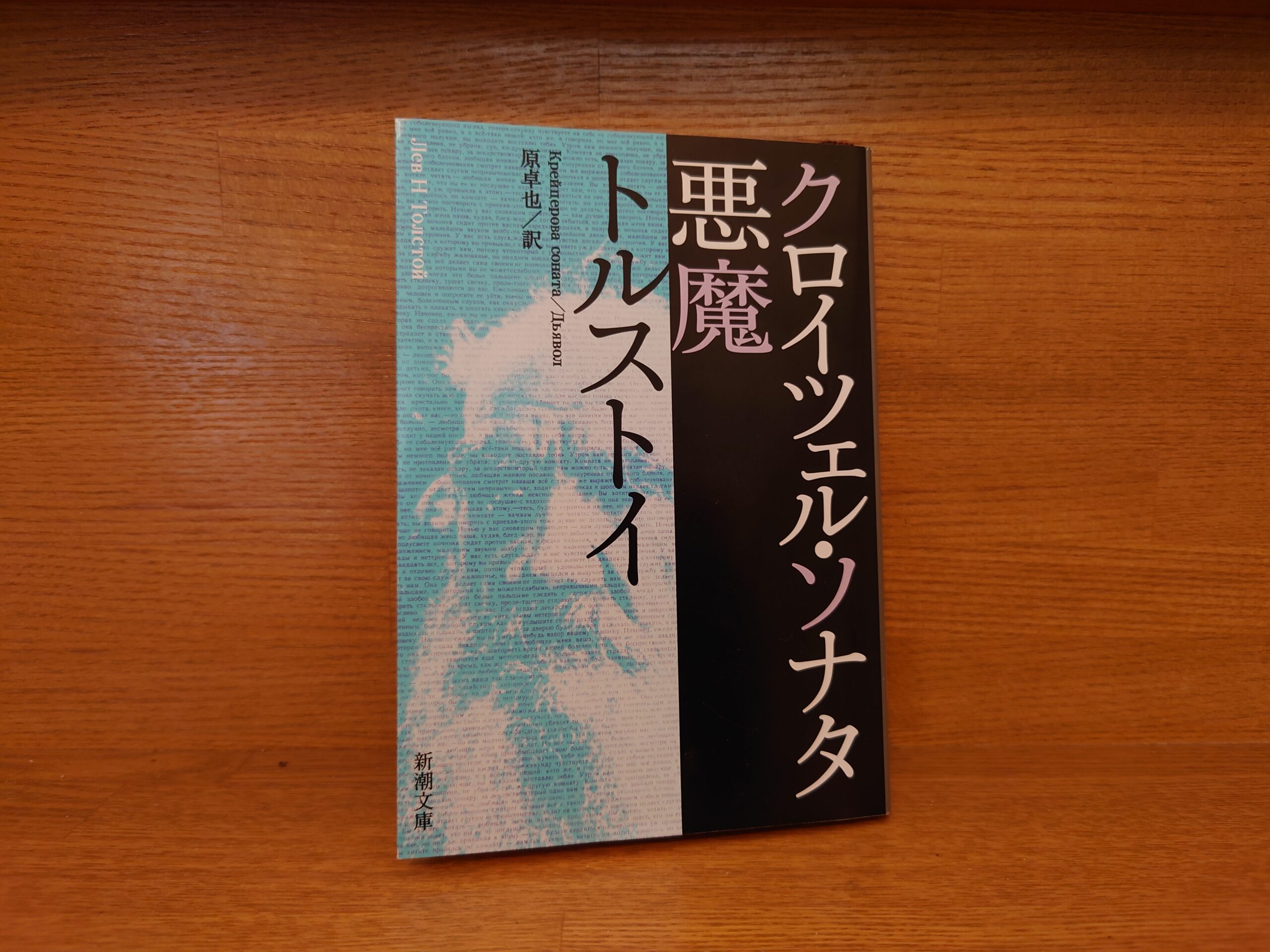
トルストイ『クロイツェル・ソナタ』あらすじと感想~不倫疑惑の妻を殺した夫。賛否両論を巻き起こした問題作
今回ご紹介するのは1887年から89年にトルストイによって書かれた『クロイツェル・ソナタ』です。私が読んだのは新潮社版、原卓也訳『クロイツェル・ソナタ 悪魔』所収の『クロイツェル・ソナタ』です。
早速この作品について見ていきましょう。
だれでも、情欲をいだいて女を見る者は、心の中ですでに姦淫をしたのである。
――マタイによる福音書第5章28
妻を殺した男が語る、性の欲望のおそろしさと罪深さ――。嫉妬のため妻を殺した男の告白を通して、惨劇の理由を迫真の筆に描き、性問題に対する社会の堕落を痛烈に批判した『クロイツェル・ソナタ』、実在の事件に自身の過去の苦い経験を交えて懺悔の気持をこめて書いた『悪魔』。性的欲望こそ人間生活のさまざまな悪や不幸、悲劇の源であるとして、性に関するきわめてストイックな考えと絶対的な純潔の理想とを披瀝した中編2作。
60歳を越えてトルストイは、性の問題をテーマとした作品を書き続けた。「『クロイツェル・ソナタ』を通して言いたかった5つのこと」として、トルストイは「あとがき」を付している(本書解説参照)。トルストイの性に対する考え方がわかります。
【目次】
クロイツェル・ソナタ
悪魔
訳者解説本書収録『クロイツェル・ソナタ』より
Amazon商品紹介ページより
俺は誠実な人間だ。立派な両親の間に生れた子供だ。一生涯、家庭生活の幸福を夢みてきたし、一度も浮気をしたことのない男なんだ……それなのに、どうだろう!五人も子供がありながら、あの女は、赤い唇をしているというだけであんな音楽家に抱かれるなんて!いや、あんなのは人間じゃない!牝犬(めすいぬ)だ、さかりのついた牝犬なんだ!今日までずっと、子供を愛しているふりをしてきながら、その子供たちの部屋の隣りで。しかも、俺にあんな手紙を書いてよこすなんて!それでいて、恥知らずに頸(くび)ったまにかじりつくんだ!(本書155ページ)
この作品は嫉妬に狂った夫が不倫疑惑の妻を殺してしまうという筋書きなのですが、これがとにかくやりきれない小説なんです・・・
その理由は後ほどお話しすることにして、この作品を読んでいくにあたりぜひとも知っておきたいのがこの作品が生まれてきた背景になります。
この悲劇的な作品はいかにして生まれてきたのか。
それには、実はトルストイ自身の家庭崩壊や理想と現実との乖離が大いに関係していたのでありました。
少し長くなりますが川端香男里著『人類の知的遺産52 トルストイ』よりその顛末を見ていきます。
(1880年代初め頃より※ブログ筆者注)社交界と都会の生活を愛するソフィヤ夫人とトルストイの溝は次第に深まって行った。貧しい人々に対する同情において夫人も夫に劣るわけではなかったが、すべての人間のうちに自分にかかわる人間的なものを見、一人でも人間が恐ろしい状況に置かれていることに心の痛みを感じ、社会の不正を憎み、自分の財産を罪悪視するようになったトルストイはソフィヤ夫人からはますます遠い存在になって行った。
ソフィヤは健全で平凡な主婦であった。それゆえ夫にはついて行けなくなったのである。一八八三年春、妻に妥協して財産の管理を妻に任せるが、富は民衆から奪ったものだと考えるトルストイは自分の主張と実際の生活の矛盾に苦しんだ。
一八八四年六月、トルストイは妻と激しく言い争って家出をしたが、身重の妻のことを考え引き返した。この時生れたのが三女アレクサンドラで、後に父のもっとも忠実な弟子とも秘書ともなった。
この家庭内の不和を激化させる要因となったのが、トルストイの高弟と称せられるチェルトコーフの出現である。チェルトコーフは友人の『トルストイ伝』の著者ビリュコーフと並んで最初のトルストイ主義者であった。
実務的能力に富み、すぐれたプロパガンチストであったチェルトコーフは、大衆のための本を出す出版社「ポスレードニク」(仲介者)社をつくり、トルストイは全面的に協力した。『コーカサスの捕虜』『人は何で生きるか』などがこの社から出版された。
チェルトコーフとソフィヤ夫人は当初は親しくしていたが、チェルトコーフが次第にトルストイに影響力をもち始め、トルストイを教祖に持ち上げ、その教義を実生活において忠実に実行するように強要し始めてから、両者の不仲は決定的となった。
一八八六年、トルストイは妻に譲歩し、資産を夫人と子供たちに分け、また全集を出版する権利を妻に与えた。ドストエフスキイ夫人が同じやり方で作品を出版していることを知っていたソフィヤ夫人がトルストイ家の大家族を支えるために、前から計画していたことであった。(中略)
一八八七年夏、息子のセルゲイがヴァイオリニストのリャソッタとべートーベンの「クロイツェル・ソナタ」を弾き、トルストイはそのプレストの部分を聞きながら、その音楽の魅力につき動かされるように立ち上って窓から庭と空を眺め溜息をついたという。『クロイツェル・ソナタ』の成立については、その他さまざまの目撃者・証人がいて時期的にも互いに矛盾しているが、「クロイツェル・ソナタ」はその翌年にも繰り返し聞いたことは確かなようである。
トルストイは家庭の不和と悲劇的な体験の中から、自分が打倒しなければならない最大の敵が、家庭の根幹をなしている愛と性欲であることを発見していたのだった。
『クロイツェル・ソナタ』はこうして、愛について書かれた本の中でもっとも絶望的なものとなった。
「クロイツェル・ソナタ」を一緒に弾いてこの音楽に酔い痴れ、そしてヴァイオリニストと姦通した妻を殺害した男による告白という形で書かれたこの小説は(痴情による殺人、いわゆる「イタリア式離婚」で、裁判で罪を免れるのである)、検閲にあって発表を禁止されたが、何百何千の単位で筆写されて争って人々に読まれた。
皇帝や皇后まで読んで、この作品についての論争はロシアの全階層に広まった。チェルトコーフは作品の主人公の独白で語られていることをもっとはっきりさせ、はっきりとしたモラルを読者に与えるべきだと主張した。このような考えに基づいて書かれた「あとがき」には、極端な女性敵視、禁欲主義が目立つが、道徳的な理由から夫と妻は結婚生活においても性的に汚されることなく兄妹のように生きるべきだと説いている時にソフィヤ夫人はまた新たな妊娠の徴候を感じている。
この作品に見られる結婚と女性に対する露骨な攻撃を、読者はトルストイ自身の結婚生活の不満に基づいているものと考えた。ソフィヤ夫人にとってはきわめて不利な状況だった。彼女は、自分を犠牲にして成り立つこのような世間の評価に対して戦うために、自ら皇帝に会い、『クロイツェル・ソナタ』の発禁処分を解くよう陳情した。一八九一年四月十三日のことである。この小説を評価していたアレクサンドル三世は快くこの願いを聞き入れた。ソフィヤ夫人の日記には皇帝との会見が感動的に描かれている。
講談社、川端香男里『人類の知的遺産52 トルストイ』P108-113
※一部改行しました
いかがでしょうか。この時点で私はかなりやりきれない気持ちになってしまいます。
トルストイの家庭生活がどういうものだったかというのはあまり知られていませんが、想像よりはるかに悲劇的なものでした。最後の家出事件は有名ですが、実はそれ以前の生活もそれに劣らず苦悩に満ちたものだったのです。
「よりよく生きるために何をすべきか」を説いていたトルストイの実生活を知ると、いつも私は胸が苦しくなります。
若い頃より地獄のような苦しみを味わってきたドストエフスキーが、最晩年になって幸福な家庭生活を送って死んでいくのとはまさに対称的です。(そうしたドストエフスキーについては以下の記事「アンナ・ドストエフスカヤ『回想のドストエフスキー』ドストエフスキーの奥様による回想記」をご覧ください)
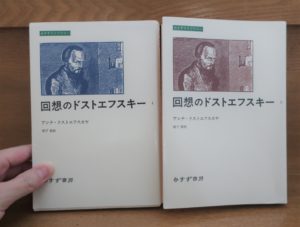
では、いよいよ作品そのものの中身に入っていくことにしましょう。
作品を読めばわかるように、トルストイはこの小説の中で性に関するきわめてストイックな考えと、絶対的な純潔の理想とを披瀝している。男女の性的な関係を彼は三つの段階に分けて考える。
第一の段階は、男性に対する女性の隷属で、女性は男性の性欲に支配され、絶対的貞操を要求される。
第二の段階は、男性に対する女性の反抗であり、ここでは女性も権利の平等を要求して性欲を自由にみたす。
第三の段階は、偽善の仮面をかぶった道徳で、ここでは両性間にはもはやなんら精神的結びつきはなく、惰性による醜悪な性欲の満足があるだけとなる。
トルストイは、性的欲望こそ、人間の生活のさまざまな悪や不幸、悲劇の源である、と考えていた。『クロイツェル・ソナタ』という作品にトルストイは、十ぺージ以上もある「あとがき」を付けているが、その中で『クロイツェル・ソナタ』を通して言いたかったこととして、次の五つをあげている。
㈠、性行為は健康にとって必要なものという考えは誤りであり、人間は酒や贅沢な食事などを節制し、勤労することによって、性的欲望を抑えねばならない。性行為によって生じ得る結果、すなわち子供から、自己を解放しようとしたり、その重荷をもっぱら女性にのみ押しつけたり、結果の生ずるのを予防したりする条件の下での性行為は、卑劣な行いであることを、人は理解しなければいけない。
㈡、愛する者同士の性的な結びつきを、詩的な高尚な至福のようにすえることをやめなければいけない。
㈢、愛の関係の持続にとって子供は障害であるという考えから、避妊したり、子供を作れぬ身体にしたりするようなことは、絶対にしてはならないし、妊娠中や、乳で子供を育てている期間には、性行為を控えねばいけない。
㈣、子供たちを贅沢に、甘やかに育てることは、いたずらに思春期の苦しみを増大させる結果を招くだけであるから、子供は質実剛健に育てなければいけない。
㈤、愛の対象との結合は、神、人類、祖国、学問、芸術などへの奉仕という、人間にふさわしい目的の達成を困難にするだけであることを、理解しなければならない。
この五つのことを見てもわかるように、トルストイは、もっとも望ましいのは絶対の純潔をつづけることであり、それがむりならば徹底的に一夫一婦の原則を守り通してかりそめの姦淫をもゆるしてはならぬ、と考えていたのだった。彼自身、性の欲望がいかに兇暴であり、人間をあやまらせるかを、みずからの体験で知りつくしていたからこそ、ここまで徹底した極論を示さずにはいられなかったのである。
新潮社版、トルストイ、原卓也訳『クロイツェル・ソナタ 悪魔』P266-268
※一部改行しました
トルストイは作品のあとがきで、この小説を貫く思想としてこれらのことを表明しました。
これらはあまりにストイック、あまりに極端な見解であるため、当時の人はもちろん、現代を生きる私たちにもなかなか頷けるようなものではありません。
しかもこの作品のストーリーがまた強烈なのです。
大きな流れとしては「不倫をしていた妻を殺してしまった男が自分の体験を語る」というシンプルなものなのですがこれがもうなんと言ってよいものか・・・
浮気性な妻が夫を顧みずに散々悪さをしたあげく夫に殺されてしまったのならまだわかります。
ですが、実際のところ、この2人の関係はそもそも破綻していたのです。
夫は夫で最初から女性は「こうあるべき」という理想を持ち、「妻もそうあるべきだ」という姿勢を崩しません。勝手に理想を作り上げ、それに合致しない妻に不満を溜め込み、「こんなはずではなかった」とどんどん心が離れていきます。彼は決して妻に歩み寄ろうとしませんでした。
この作品は「夫による語り」で進んでいきますので、妻が何をどのように感じていたかはわかりません。たしかに妻として悪い面もあったのかもしれませんが、かなり一方的な物言いになっています。
当然、そうなっていくと妻の心も離れていき、お互いがお互いをわかり合おうとしない冷戦状態になります。
そんな中、妻が満たされない心を癒すために他の男とそういう関係になってしまってもおかしくありません。
案の定、不倫が始まってしまいます。
しかし、ここで不思議なことにこれまで散々妻の悪口を言っていた夫が猛烈に怒り狂いだします。これは嫉妬なのでしょうか。嫉妬ならば妻のことが好きだからこそということになるのですがそれもどうも微妙なところ。これは読む側の判断にも委ねられますが、何はともあれ、夫は烈火のごとく怒ります。
「妻が夫を裏切るとは何たることか!」
正直、「よく言うよ」と私は思ってしまいました。これまで散々妻の悪口を言い、歩み寄ろうとしても来なかったのに、いざ不倫を知ると自分は被害者で相手は極悪人。これでは妻が気の毒です。
そしてあろうことか夫は怒りのままに妻をナイフで刺し殺してしまうのでありました。妻は死の間際、夫を呪いながら息を引き取っていきます。
「最悪だ・・・最悪だこの小説は・・・」と私は胸が痛くなりました。正直、この作品を読む以前からトルストイの宗教的著作にかなりのダメージを受けていた私にとって、この作品はとどめの一撃になりました。
「トルストイ主義にはついていけない・・・」
残念ながら私にはトルストイ主義者の素質はなかったようです。
ドストエフスキーかトルストイか、どちらかひとつでしかありえないとよく言われますが、心の底から納得です。ふたりはあまりに違いすぎます。
さて、『クロイツェル・ソナタ』を悪しざまに言ってしまいましたがこれはあくまで私の感想です。この作品がだめだとかそういうわけでは決してありません。
作品そのものとしては当時から絶賛する声もありましたし、作品としてその感化力が恐ろしく、人々の間で巨大な論争を引き起こしている時点でこの作品の強力なパワーを証明しています。現に私も恐ろしく感情を動かされています。どうでもいい作品だったならばこんなにもダメージを受けることはなかったでしょう。
ましてや現代の倫理観や私の個人的なものの感じ方を基準にこの作品を切って捨てることはナンセンスです。
その上で私個人としてはこの作品は厳しいものがあったということに過ぎません。
私はドストエフスキーを学ぶためにトルストイをこうして学んでいます。
趣味として楽しむための読書というだけならわざわざ苦しくなるような本を読む必要はありません。
ですが、「その人について学ぼう」と思うなら、苦しくても著者と向き合わなければなりません。
自分とこの人は合わないんだなということを感じることも勉強の大切な一面だと思います。
そういう意味で『クロイツェル・ソナタ』はトルストイを学ぶ上で強烈な印象を残した作品でした。
トルストイの激烈さを知るという意味でも、この本はとても適した作品なのではないでしょうか。
以上、「トルストイ『クロイツェル・ソナタ』あらすじと感想~不倫疑惑の妻を殺した夫。賛否両論を巻き起こした問題作」でした。
Amazon商品ページはこちら↓
次の記事はこちら
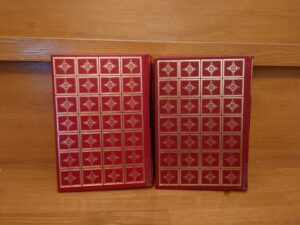
前の記事はこちら
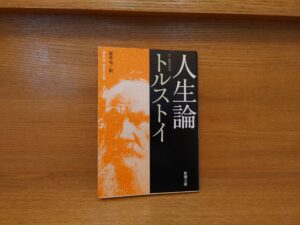
関連記
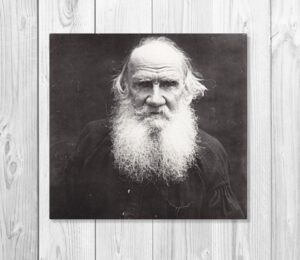
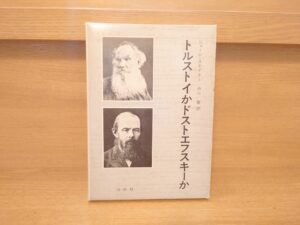
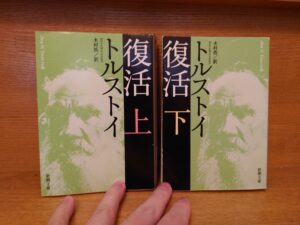
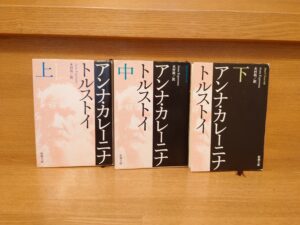



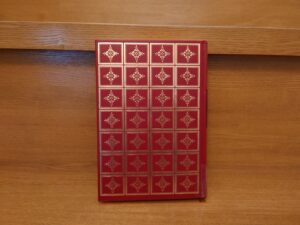

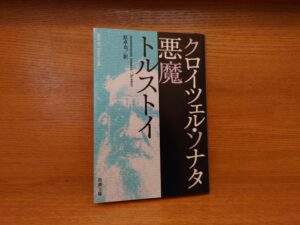

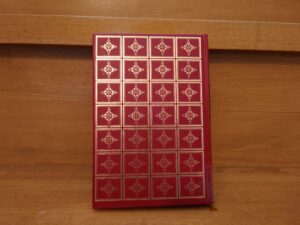
コメント